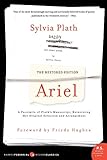“You do not do, you do not do / Any more, black shoe…” The poet’s voice is strong, piercing. Her tone arch, sly. A few lines later, as she proclaims, “Daddy, I have had to kill you,” she sounds like she’s about to burble into a mean, delicious laugh.
The poem is Sylvia Plath’s patricidal “Daddy” and the voice her own, recorded for the BBC in October 1962, less than five months before her death at age 30. That day, she read aloud more than a dozen of the poems that would help make up Ariel, the posthumous collection that would make her name, as she herself foretold.
 Writing about these same recordings in the New York Review of Books in 1971, Elizabeth Hardwick describes how “taken aback” she was by them. “Clearly, perfectly, staring you down,” she writes, describing Plath’s delivery. “She seemed to be standing at a banquet like Timon, crying, ‘Uncover, dogs, and lap!’”
Writing about these same recordings in the New York Review of Books in 1971, Elizabeth Hardwick describes how “taken aback” she was by them. “Clearly, perfectly, staring you down,” she writes, describing Plath’s delivery. “She seemed to be standing at a banquet like Timon, crying, ‘Uncover, dogs, and lap!’”
I still remember my surprise at hearing these recordings on my tinny cassette recorder in my freshman dorm room more than 25 years ago. I suppose I expected something more ethereal, a doomy Ophelia floating down the river. There was, instead, something ferocious about them. First, it unsettled me; then it excited me.
 Like many women, I saw myself in Plath: a diligent, high-achieving young woman, a striver privately bristling against social conventions and punishing gender roles. (“A living doll, everywhere you look,” she writes in “The Applicant.” “It can sew, it can cook…will you marry it, marry it, marry it?”) But Plath more than bristled; she burned. In so many of her poems and in her mordant, acid-tongued novel The Bell Jar, you can feel the rage rippling off the pages.
Like many women, I saw myself in Plath: a diligent, high-achieving young woman, a striver privately bristling against social conventions and punishing gender roles. (“A living doll, everywhere you look,” she writes in “The Applicant.” “It can sew, it can cook…will you marry it, marry it, marry it?”) But Plath more than bristled; she burned. In so many of her poems and in her mordant, acid-tongued novel The Bell Jar, you can feel the rage rippling off the pages.
Growing up in the Midwest in the 1980s, I was a hard worker, a straight-A student, a people-pleaser, disciplined and dutiful. A Tracy Flick without the swagger. But when I first read “Daddy,” its incantational rhythm, its audacious analogies (the speaker likens herself to a concentration camp victim, her father to a Nazi, her husband to a vampire), it unleashed something inside me. I wanted to write like that. Bold, risk-taking, confrontational. “The work of a mad woman on fire”: That’s how my creative writing professor charitably classified the deeply derivative poems I wrote under Plath’s spell. But it didn’t matter that they were derivative. What mattered was that I—this well-behaved, compliant young woman—was writing from deeper, darker places, reservoirs of anger and frustration I’d always denied were there.
Even back then, it felt to me like Plath was writing from this secret, shared subterranean place—a place where girls and women let loose all their “unacceptable” feelings: bald ambition, aggression, frustration, resentment, rage. But now, in 2018, that place no longer feels so subterranean. “The anger window is open,” Rebecca Traister wrote last November. “For decades, centuries, it was closed: Something bad happened to you, you shoved it down, you maybe told someone but probably didn’t get much satisfaction—emotional or practical—from the confession.” In the aftermath of the 2016 campaign, the inauguration, the Harvey Weinstein scandal and everything that’s followed, it’s impossible to shake the feeling that the lid’s been torn off. The subterranean is no longer subterranean. Instead, it’s terra not-so-firma. Everything’s different now.
There’s always been a drumbeat of disapproval of Plath’s work, and it often comes down to: She’s just too much. A 1966 Time review of Ariel refers to “Daddy” as that “strange and terrible poem” Plath composed during her “last sick slide toward suicide,” adding that its style is as “brutal as a truncheon.” M.L. Rosenthal’s 1965 review of Ariel in The Spectator finds several of the poems “hard to penetrate in their morbid secretiveness” and puzzles uncomfortably over the way they seem to “make a weirdly incantatory black magic against unspecified persons and situations.” Years later, in the New Criterion, Bruce Bawer would refer to Plath’s “shrill, deranged” voice in the Ariel poems. She’s too much, too loud, too hysterical; she’s taking up too much space. It’s fascinating to read this criticism today, when political and cultural rhetoric runs searingly hot, when the standards for hyperbole have dramatically shifted, and when charges of female shrillness resonate more deeply than ever.
 That’s why I’ve found myself returning to Plath so much in the last two years. Her recordings became the de facto soundtrack to my latest novel, Give Me Your Hand, begun in the early stages of the 2016 presidential campaign and completed just after the inauguration. It’s the story of three brilliant, ambitious women seeking a cure for premenstrual dysphoric disorder, otherwise known as “extreme PMS.” There was something deeply unsettling about trying to bring to life the creeping misogyny within the male-dominated world of scientific research as the headlines blared. One day, it was candidate Donald Trump dismissing Megyn Kelly’s pointed questions by seemingly referencing her menstrual period; the next, it was “Grab them by the pussy.” Amid the cries of “Lock her up” and “Bern the Witch,” I listened to Plath over and over, but it was different now. Hearing her firm, authoritative voice, I couldn’t help thinking of the incessant criticism of Hillary Clinton’s voice as “shrill” and her laugh a cackle. I imagined what those critics might think of Plath’s voice: ruthless, relentless, witchy. Suddenly, the recordings seemed to take on an even greater strength. They felt bracing, invigorating. They felt like a battle cry.
That’s why I’ve found myself returning to Plath so much in the last two years. Her recordings became the de facto soundtrack to my latest novel, Give Me Your Hand, begun in the early stages of the 2016 presidential campaign and completed just after the inauguration. It’s the story of three brilliant, ambitious women seeking a cure for premenstrual dysphoric disorder, otherwise known as “extreme PMS.” There was something deeply unsettling about trying to bring to life the creeping misogyny within the male-dominated world of scientific research as the headlines blared. One day, it was candidate Donald Trump dismissing Megyn Kelly’s pointed questions by seemingly referencing her menstrual period; the next, it was “Grab them by the pussy.” Amid the cries of “Lock her up” and “Bern the Witch,” I listened to Plath over and over, but it was different now. Hearing her firm, authoritative voice, I couldn’t help thinking of the incessant criticism of Hillary Clinton’s voice as “shrill” and her laugh a cackle. I imagined what those critics might think of Plath’s voice: ruthless, relentless, witchy. Suddenly, the recordings seemed to take on an even greater strength. They felt bracing, invigorating. They felt like a battle cry.
There’s a long tradition of playing connect the dots between Plath’s biography and her writing. I, too, used to indulge in this line of thinking, titillated by the details of Plath’s life: her struggles with depression, her tumultuous marriage to poet Ted Hughes, her suicide. But this approach to her work feels different now too. It’s a way to diminish her writing as “personal” and thus small, even narcissistic. The argument is familiar. It’s the same one that pigeonholes fiction by and about women as “domestic novels” or movies about women as “chick flicks.” But as with those novels and movies, the issues with which Plath wrestles are the ones now consuming us: fear of female ambition, fear of the female body and the female voice, and perhaps most of all, fear of female power. The subterranean space Plath gave voice to for decades has become our daily landscape, and she serves as our sage, our guide. “I know the bottom,” she writes in “Elm.” “I know it with my great tap root: / It is what you fear. / I do not fear it: I have been there.”
It’s no surprise, then, that Plath seems more omnipresent than ever: Kirsten Dunst is developing The Bell Jar for the screen, a recent auction of Plath’s belongings garnered $551,862, and an exhibit of her belongings at the National Portrait Gallery featured everything from a ribboned ponytail of her to her Girl Scout uniform. But there’s something particularly exhilarating about young women responding to her with the same fervency I did a quarter century ago. As I listened to that cassette of Plath reading, millennial women tattoo The Bell Jar’s “I am I am I am” on their forearms, or fill their Tumblr and Instagram feeds with Plath quotes, excerpts and stanzas transformed into cris de coeur. The hands-down favorite is from “Lady Lazarus.” “Beware,” the speaker warns. “Out of the ash I rise with my red hair and I eat men like air.”
Lately, whenever I talk with a young woman about Plath or teach “Daddy” to undergrads, I think about the first critique of Plath I ever heard. It was a movie scene: a man visiting a woman’s apartment for the first time plucks a copy of Ariel from her book shelf. “Interesting poetess,” he says, “whose tragic suicide was misinterpreted as romantic by the college-girl mentality.” The woman fumbles shyly and replies, self-effacingly, “Oh, yeah, right. I don’t know. Some of her poems seem neat.” Watching this exchange, I felt the burn of recognition. Because at the time, I was that “college girl” in thrall to Plath. I’m a cliché, I thought. But on a deeper level, I felt dismissed, diminished. The movie, of course, was Woody Allen’s Annie Hall. Now, when I watch that scene—the man’s casual dismissal, the woman’s abashed response, the laughter in the audience—it looks so different. Everything looks different now.
Image: Flickr/summonedbyfells
The post A Mad Woman on Fire: On Sylvia Plath and Female Rage appeared first on The Millions.
from The Millions https://ift.tt/2zwZCUz
Comments
Post a Comment